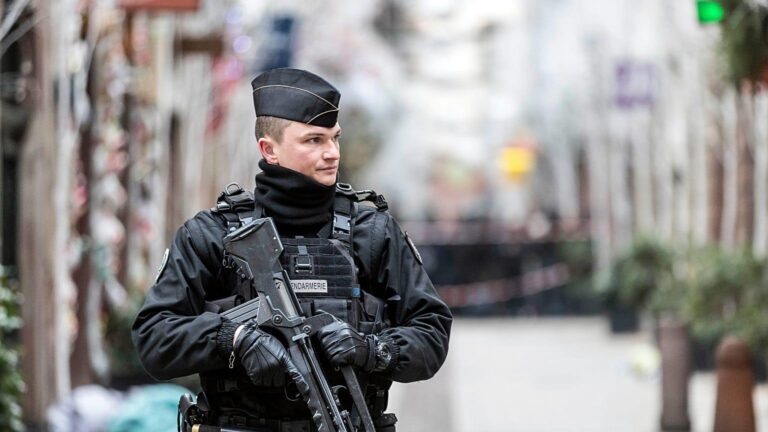France has launched an investigation into the killing of a Tunisian national, treating the case as a potential terrorist crime. The incident, which has raised alarms across the country, is being closely scrutinized as a critical test of France’s minority and counterterrorism policies. Authorities are probing the circumstances surrounding the attack amid growing concerns over national security and social cohesion, highlighting the ongoing challenges faced by the government in balancing integration and safety. The case has also drawn attention to the broader dynamics within France’s diverse communities, underscoring the fragile state of intercommunal relations in the current political climate.
France Launches Terrorism Investigation into Killing of Tunisian National
French authorities have initiated a terrorism inquiry following the fatal shooting of a Tunisian national in the Paris metropolitan area. The victim, whose identity remains undisclosed pending family notification, was targeted in what officials suspect to be an ideologically driven attack. Law enforcement agencies are collaborating with anti-terrorism units to unravel the motive, with initial investigations suggesting possible links to extremist networks. The case marks a significant development against the backdrop of France’s ongoing struggle to reconcile national security concerns with the rights and integration of its diverse minority communities.
Observers note that this probe serves as a critical barometer for the government’s minority policies, which have faced increasing scrutiny amid rising societal tensions. Key factors in the investigation include:
- Surveillance footage analysis and witness testimonies
- Community liaison efforts to prevent retaliatory incidents
- Reviewed security protocols in high-risk urban zones
Authorities emphasize maintaining public order while ensuring the rights of minority groups are protected. The outcome of this high-profile case is expected to influence future legislative and social measures addressing extremism and communal harmony in France.
Community Leaders Call for Enhanced Protection of Minority Groups in France
Community leaders across France have united in expressing deep concern over the recent killing of a Tunisian national, urging the government to intensify safeguards for minority groups in the country. The incident, under investigation as a potential terrorist act, has galvanized civil rights organizations, immigrant advocacy groups, and local officials to press for comprehensive reforms. Their calls focus on mechanisms designed to prevent hate crimes, improve social integration, and ensure equitable protection under the law for vulnerable populations.
Among the proposed measures advocated by these leaders are:
- Enhanced community policing initiatives that build trust between law enforcement and minority neighborhoods
- Mandatory cultural sensitivity and anti-bias training for public servants and educators
- Creation of rapid response task forces to address and investigate hate crimes more efficiently
- Expanded funding for platforms that promote intercultural dialogue and conflict resolution
| Stakeholder | Role | Key Demand |
|---|---|---|
| Immigrant Advocacy Groups | Representation, support | Stronger anti-discrimination policies |
| Local Officials | Policy implementation | Inclusive community engagement |
| Civil Rights Organizations | Monitoring, advocacy | Transparency in investigations |
Government Faces Scrutiny Over Effectiveness of Counterterrorism Measures
French authorities are under increasing pressure as investigations unfold into the killing of a Tunisian national, suspected to be linked to extremist motives. Critics argue that this case exposes critical gaps in the nation’s counterterrorism framework, especially in urban centers with diverse populations. The incident has reignited debate over whether existing policies adequately address the complexities of radicalization and minority integration. Key concerns include:
- Effectiveness of surveillance and intelligence-sharing across agencies dealing with extremist threats.
- Community outreach programs designed to engage minority groups and prevent alienation.
- Legal provisions balancing security and civil liberties in counterterrorism operations.
Data released by government sources suggests a mixed record in thwarting potential terrorist plots over the past five years. The following table summarizes recent trends in counterterrorism performance:
| Year | Foiled Attacks | Arrests | Community Initiatives |
|---|---|---|---|
| 2019 | 12 | 34 | 8 |
| 2020 | 9 | 28 | 10 |
| 2021 | 15 | 40 | 12 |
| 2022 | 10 | 35 | 15 |
Experts Recommend Policy Reforms to Strengthen Social Integration and Prevent Radicalization
Authorities and social scientists alike stress the urgent need for comprehensive policy adjustments designed to fortify community bonds and curb the spread of extremist ideologies. Emphasizing prevention over reaction, experts underscore that enhancing educational opportunities, promoting intercultural dialogue, and ensuring equitable access to employment are foundational steps. These measures aim to dissolve the socio-economic disparities that often serve as catalysts for alienation and radicalization.
Key recommendations include:
- Revamping educational curricula to incorporate civic engagement and critical thinking skills.
- Strengthening community policing initiatives to build trust across diverse groups.
- Implementing targeted social support programs for at-risk youth and families.
- Promoting inclusive public dialogues that give voice to marginalized communities.
| Policy Area | Proposed Action | Expected Outcome |
|---|---|---|
| Education | Introduce multicultural curriculum | Greater cultural awareness |
| Employment | Job training for minority youth | Reduced socio-economic gaps |
| Community Engagement | Support local dialogue forums | Enhanced social cohesion |
In Summary
The investigation into the killing of the Tunisian national represents a pivotal moment for France as it grapples with the challenges of integrating its minority communities while ensuring national security. How authorities classify and respond to this case will likely influence future policies and public discourse on terrorism and social cohesion. As France faces mounting pressures from both domestic and international fronts, the outcome of this probe could serve as a critical barometer for the country’s commitment to justice and its approach to fostering inclusivity amidst rising tensions.




